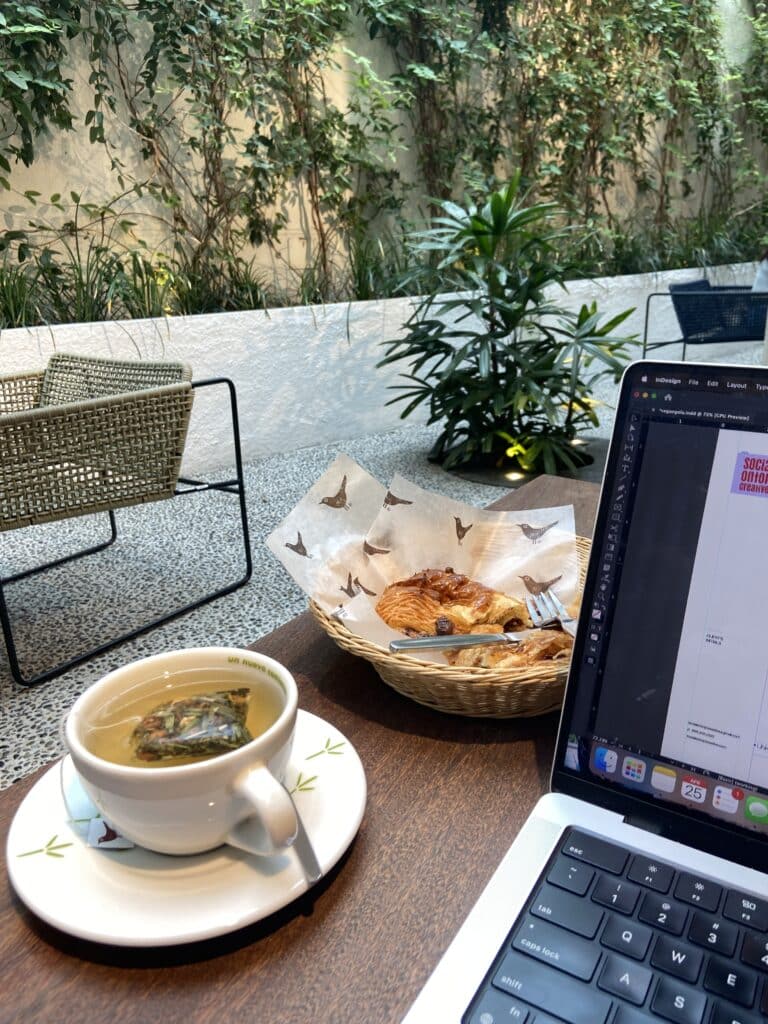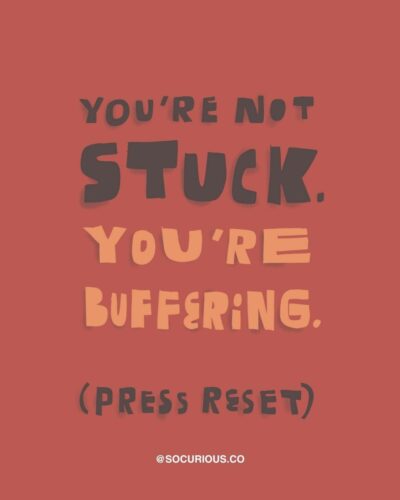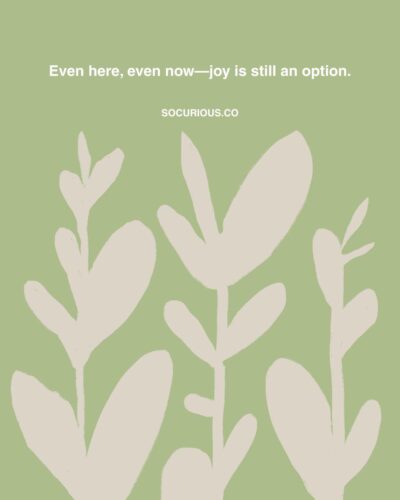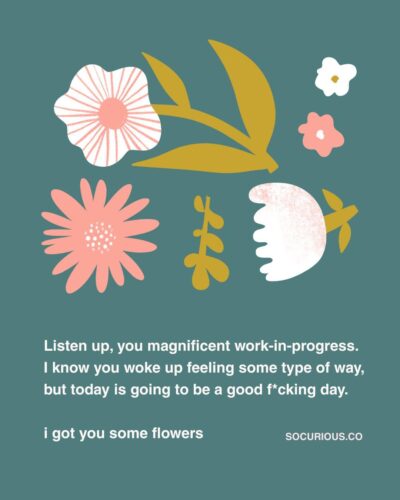
“I’m smart. I’m talented. I’m kind. And I’ve earned the respect of everyone I work with in every department. Clients love me. I’m producing interesting work that pushes the boundaries of what we can do here. But I’m also unhappy—unbelievably unhappy.”
It was a final desperate plea to the president of the company I absolutely did not want to quit.
I was living my dream. A creative director making video content for nonprofits and government agencies that creates positive change in the world, instead of selling products.
But the most meaningful change was being ignored.This company, I realized, was not just a bad place to work– it was toxic.
Her response was measured and flat, “Everything you’ve experienced, I’m aware of, and we’re making change, but it will take time. It won’t happen immediately.”
And that’s when it clicked.
Change was unlikely because the system was functioning in the way that it was designed. Attracting well-meaning, good-natured people. And turning them into stressed out, overwhelmed victims of abuse.
Eliminate the joy. Control the people.
If a friend told me their partner made them cry multiple times a week, triggered panic attacks, and caused high blood pressure from constant stress, I’d tell them to leave.
So, I took my own advice—and finally quit.
And now I’m a couple weeks into building my own company, SoCurious–a venture that I hope makes a ripple effect of positive change in the world.

Section 1: How did I even end up working at a toxic corporate workplace?
It started with the movie Boomerang–the Eddie Murphy cult classic with Robin Givens and Halle Berry about a black advertising agency. And at 8 years old, after watching the movie, I decided I wanted to be a Creative Director.
Growing up, I was the kid who loved commercials more than the actual TV shows. I was captivated by how these bite-sized pieces of content could inform, spark joy, and even convince people to take action. To me, commercials felt like the most accessible form of art—practical and impactful. As a child, I even wrote my own versions of Mentos commercials because I believed ‘fresh’ would go better with more diverse talent.
I earned my undergraduate degree in graphic design and started my career as a web designer at a small studio. From there, I moved on to a regional agency, developing ad campaigns for state and city tourism.
After completing a master’s in Arts Administration, I worked at an art museum and an arts high school before launching my own design studio to support small businesses. Eventually, I became a Creative Director at a social media agency, working on consumer goods, education, and tourism. Later, I transitioned to B2B advertising, collaborating with companies like Hillrom and Amazon Business.
But after working nonstop during the pandemic, I hit my first significant wave of burnout and began to rethink what work is and how it should feel.
I briefly worked at a tech company in the publishing industry, but eventually decided to take a year off—”my year of rest and relaxation,” a term I borrowed from Ottessa Moshfegh, who wrote a delightfully tragic novel of the same name. In the book, the unnamed protagonist gradually escalates her use of prescription medications in an attempt to sleep for an entire year.
For me, though, instead of sleeping, my goal was to create. To write, to draw, to make things that sparked joy for myself and the world. And to see if I could figure out how to make a full-time living as an artist and entrepreneur.
My year of rest and relaxation was a liberating experience that was full of beautiful twists and turns.
I started a podcast called SoCurious About and did 8 episodes that are actually pretty solid. Like I recently re-listened and thought, ‘Why am I not still doing this?’
I taught myself video and launched a Youtube channel. My first attempts were, to be frank, cringey. But that’s the beauty of creating—you discover your voice by showing up regularly. Even when you hate the way your mouth moves when you say certain words or when your eyes bug out because you’re too excited about what you’re talking about.
I also got a book deal with Sasquatch Publishing, a subsidiary of Penguin Random House and wrote and illustrated the Reset Workbook. I don’t promote it enough, but it’s by far the most interesting and useful thing I’ve created to date.
But an annual checkup revealed my worst nightmare: my neutrophil numbers were lower than average, and it seemed I might have cancer.
So, being the reliable Taurus that I am, I cried, I prayed, and I applied for three jobs.
Within two weeks, I had secured a steady income, access to exceptional health insurance, and the opportunity to ride out a series of blood tests to determine if I had cancer. The best part was that I could do this at a company focused on creating positive change in the world.
However, my dream job quickly devolved into a nightmare.

Section 2: What it’s really like working at a toxic company
Advertising can have its challenges. It’s highly competitive, there’s a lot of pressure to satisfy clients, and the constant churn of work often leads to burnout. But over the course of my career, I’ve learned meaningful tactics for managing the stress that comes with working in this fast-paced industry. For me that meant:
- No work after 7:00pm
- As little work on weekends as possible
- And using all of my vacation time to regularly schedule rest
Combined with daily walks and good sleep hygiene, these practices kept me relatively unscathed by day-to-day stress. (Though, there are a few stories I might share in future articles that could definitely raise your eyebrows.)
However, at this particular workplace, I encountered a level of challenge I hadn’t experienced before.
Let me preface this by saying that what follows might come off as a bit whiny, but it also reflects broader truths about work, which I imagine you might relate to.
1. I poured everything into my work, pushing creative boundaries and earning respect from peers and clients. Yet, despite my efforts, internal leadership consistently disregarded my contributions. I meticulously prepared for meetings, crafting clear, thoughtful rationales and coaching my team on effective communication. But the company operated like a dictatorship, and my voice felt unheard.
2. I raised concerns directly with management, and initially, leadership seemed receptive. They spoke of change—new systems to ease project management, new opportunities for growth. But it quickly became clear that these promises were empty. My ideas were dismissed, and I realized I was being manipulated, as control remained firmly in their hands.
3. The toxic environment began to erode my mental health. Critiques felt like personal attacks, leading to constant anxiety and even panic attacks—something I’d never faced before. The leadership’s tactics only intensified the stress, trapping me in a cycle of blame, shame, and fear.
4. There was a constant desire to reinvent processes rather than follow industry standards. Unrealistic expectations, toxic management, and a focus on inflating capacity by underbilling client projects stifled creativity. The system thrived on stress and control, leaving little room for the creativity that was necessary to make impactful work.
5. When mistakes occurred, the response wasn’t about learning from them—it was about assigning blame. But the majority of the problems occurred because there weren’t clearly defined roles and responsibilities across the team. Everyone was guessing at who should be doing what because every project was treated as if it were unique.
6. Micromanagement was the norm, with every idea and decision scrutinized. Differing opinions were unwelcome, and my 17 years of experience was dismissed unless it fit their narrative. Creativity was stifled, smothered under overbearing oversight.
8. Communication in the workplace was a disaster. As a fully remote company, the endless meetings were tedious and devoid of joy. Hostility and disrespect became routine, leading to constant misunderstandings. Leaders talked down to us, destroying collaboration and creating a suffocating work environment. We weren’t just undervalued; we were demoralized.
Each day felt like a slow-motion train wreck. I’d pour my heart into a project, only to see it derailed by ego-driven decisions and petty power plays. My ideas weren’t just ignored; they were smothered under layers of bureaucracy and indifference.
The relentless stress wore me down, and health scares piled up, forcing me to reconsider everything—my job, my career, and my life.
Staying in that environment was no longer worth the cost.

Section 3: Choosing joy over a toxic work environment.
After 13 months of enduring this toxic work environment, I reached a breaking point.
I realized I couldn’t keep sacrificing my mental health and creativity for a company that didn’t value me. That’s when I knew something had to change.
This experience forced me to reevaluate what truly mattered in my life. I had spent so much time trying to fit into a mold that was never meant for me. The anxiety and burnout were signals that I was on the wrong path, one that prioritized others’ whims over my own peace. I knew I needed to take control and redesign my life on my own terms—again.
Thankfully, I discovered that I did not have cancer. This meant that all I needed to do was save enough money to make my escape and muster the courage to jump into the unknown.
Choosing joy became my mission. I started by setting boundaries—learning to say no to what didn’t serve me and allowing joy to be my compass.
I reconnected with the things that made me feel alive, like making jokes in meetings, standing up when comments felt disrespectful, and demonstrating to leaders how to recognize the hard work the team put into their efforts.
A veil was lifted, and for the first time, I saw that the key decision-makers were acting out of fear and scarcity. While I couldn’t change their mindset, I could change my approach.
I also began to aggressively prioritize self-care, not as a luxury but as a necessity. I took longer walks each day—sometimes two—to recenter myself after destabilizing experiences. I removed Slack from my phone and did my best to engage only with tasks directly related to my roles and responsibilities.
I also redefined success. No longer was it about climbing the corporate ladder or meeting someone else’s standards.
For me, success became about living authentically, pursuing work that aligned with my values, and surrounding myself with positivity. I realized I didn’t need to remain in a toxic environment to prove my worth. My worth was inherent, and my happiness was non-negotiable.
The day I finally submitted my notice was terrifying but also liberating.
I left the toxic job behind and began to build a life centered around joy, creativity, and purpose.
While I’ve run SoCurious for many years, it’s primarily functioned as a fun way to share my ideas with the world.
But this experience shifted something in my perspective.
I’m a loving and compassionate human that wants to make a change in the world. And the only way to do that is to put your money where your mouth is (literally) and take the proverbial leap.
So, I wrote a vision for the future. And I’d like to share it with you.
But before you read it, note that this vision imagines a future I haven’t fully built yet, but I plan to implement it over the coming months. Here it goes:
SoCurious is a movement that champions the power of small, intentional actions to spark meaningful change. We believe that creativity isn’t just a skill, it’s a way of life, a force that drives us to connect more deeply with ourselves and with others.
Born from the desire to bridge the gap between personal growth and creative expression, SoCurious is where inspiration meets action, and where curiosity leads to breakthrough moments, no matter how small.
What began as a simple idea—spreading joy through a weekly inspirational email—has blossomed into something much bigger. Today, SoCurious is a platform for creativity, connection, and personal growth. We’ve expanded our offerings to include:
- Good Morning Sunshine: A daily dose of positivity and reflection delivered to your inbox—a reminder that even the smallest shifts in mindset can lead to profound personal growth.
- Joy Bombs: A stationary collection that celebrates life’s moments, big, small and utterly mundane–with designs that reflect the diversity, humor, and warmth of the world around us. You can preorder the first collection of cards here.
- Creative Reset, a group coaching program designed to empower professionals to embrace new chapters with confidence. It’s about dismantling the barriers of oppressive work cultures and discovering the transformative power of leading with compassion and integrity.
So, thank you, toxic corporate job. That breakdown led to a breakthrough.
I’m marching toward something bigger than myself—something I believe the world truly needs.
And it all stemmed from the worst experience of my career.
Much like Beyoncé, I’m turning lemons into lemonade. And, I suppose, I’m also opening a lemonade stand. Um… you want some lemonade?
This isn’t just a business for me; it’s a mission—a mission to bring more joy into the world, inspire others to connect with the people they care about, and remind everyone that even the smallest acts of kindness can have a profound impact.
I don’t know exactly where this path will lead, but I do know one thing: I’m choosing joy every step of the way. Through SoCurious, I hope to inspire others to do the same. Because, at the end of the day, life is too short to spend it in a place that doesn’t bring you joy. So why not create a life—a business—maybe even a world that does?
PS. I’m always open to new opportunities and conversations. If you have ideas to share, want to work with me, or are interested in hiring me, drop me a line at justin@socurious.co.



